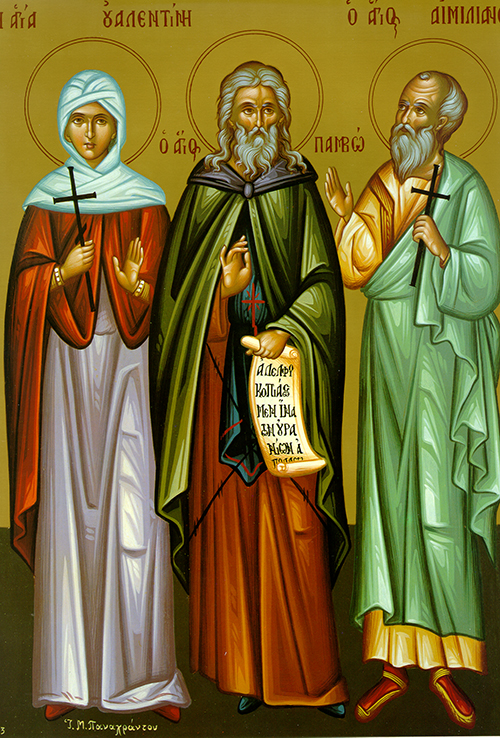

The holy martyr Hyacinth was born into a pious Christian family in the city of Amastridea (now Amastra in Anatolia). An angel that appeared gave him his name. As a three-year-old boy, St. Hyacinth asked God that a dead infant might be resurrected. The Lord hearkened to his childish prayer, and the dead one arose. Both lads afterwards grew up together, and they lived an ascetic life. St. Hyacinth once noticed how the pagans were worshiping a tree, and so he chopped it down. For this they subjected him to harsh tortures. They smashed out all his teeth, and having bound him with rope, they dragged him along the ground and threw him in prison. It was there that the holy sufferer departed to the Lord.
The holy martyr Emilian, who was a Slav, suffered for Christ during the reign of Emperor Julian the Apostate (361-363). Julian wanted to restore the cult of the pagan gods throughout the Roman Empire, and he issued an edict, according to which all Christians who failed to honor the pagan gods would be subject to death. Instead of being intimidated by these threats, St. Emilian’s faith in Christ was strengthened. The next day he went into a pagan temple and smashed the statues with a hammer. The governor ordered that St. Emilian be beaten mercilessly, and then to be burned alive. He did not perish when he was thrown into the fire, but instead the flames consumed many of the pagans who were standing about. When the fire had gone out, St. Emilian lay down upon the dying embers, and gave up his soul to the Lord. The wife of the pagan ruler was also a secret Christian, and she gathered up the saint’s relics and buried them. Afterward, a church dedicated to the holy Martyr Emilian was built at Constantinople, where his relics were transferred.
The venerable martyr Tarsykia Matskiv was a nun in the order of the Congregation of the Sisters Servants of Mary Immaculate. During the Second World War she was missioned in the Ukrainian city of Krystynopil. When the Soviet Army invaded the city in 1944, Sister Tarsykia was shot by a soviet soldier as she went to open the gates to welcome the priest coming to celebrate Divine Liturgy. She was buried in the garden of the convent under the statue of the Theotokos, as it was too dangerous to go to the cemetery. On September 2, 2007, Blessed Tarsykia’s mortal remains were exhumed, and ceremonially transferred to her hometown of Chodoriv, via the Cathedral of Stryj Eparchy. In silent procession, throngs of people escorted her relics, borne on the shoulders of priests, as pallbearers, to an outdoor Divine Liturgy, to accommodate these crowds, before being encrypted in the church itself. This was the funeral Blessed Tarsykia never had.
O Lord our God, your holy martyrs have deserved the crown of immortality on account of their good fight. Armed with your strength, they have vanquished their persecutors and crushed Satan’s dreadful might. Through their supplications, O Christ our God, save our souls.
Inflamed with the divine fervor, you were not afraid of the fire. You entered it willingly and were reduced to ashes in the flames. You went up like a sacrifice to the Master. O glorious martyr Emilian, pray for us.
1st Corinthians 10: 5-12
Brothers and sisters: We know that God was not pleased with most of [our fathers], for “they were struck down in the desert.”
These things happened as an example to keep us from wicked desires such as theirs. Do not become idolators, as some of them did. Scripture says, “The people sat down to eat and drink, and arose to take their pleasure.” let us not indulge in lewdness as some of them did, so that in one day twenty-three thousand perished. Let us not test the Lord as some of them did, only to be destroyed by snakes. Nor are you to grumble as some of them did, to be killed by the destroying angel. The things that happened to them serve as an example. They have been written as a warning to us, upon whom the end of the ages has come. For all these reasons, let anyone who thinks he is standing upright watch out lest he fall!
Matthew 16: 6-12
The Lord said to his disciples: “Be on the lookout against the yeast of the Pharisees and Sadducees.” They could think only, “This is because we have brought no bread.” Jesus knew their thoughts and said, “Why do you suppose it is because you have no bread? How weak your faith is! Do you still not understand? Do you not remember the five loaves among the five thousand and how many baskets-full you picked up? Or the seven loaves among the four thousand and how many hampers-full you retrieved? Why is it you do not see that I was not speaking about bread at all but warning you against the yeast of the Pharisees?” They finally realized he was not issuing a warning against yeast used for bread but against the teaching of the Pharisees and Sadducees.
Icon courtesy of Jack Figel, Eastern Christian Publications – ecpubs.com
Monday, July 17 –